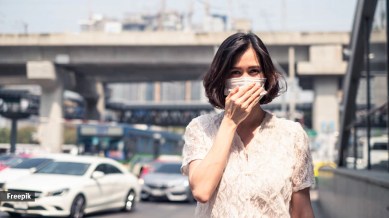📣 For more lifestyle news, click here to join our WhatsApp Channel and also follow us on Instagram
Your guide to choosing the right mask for combatting air pollution in Delhi, Mumbai
When selecting a mask for air pollution in Delhi, it's crucial to choose the one that fits properly, has high filtration efficiency, and is certified by relevant authorities. Here are the commonly used masks for air pollution, along with their uses, efficacy and materials

As the smog-laden skies of Delhi cast a muted haze over the city, and the air quality index plunges to hazardous levels, it is essential to safeguard your lungs. While there are solutions like air purifiers and filters to undo the damage caused by the unwanted pollution, you can also reach out for a face mask as defense.
Yes, these are the same masks that became our trusted companions during Covid-19. It’s time to take them back out and shield your nose and mouth to fight pollutants instead. But how can we choose the right mask? Well, we reached out to experts to understand the best available options out there.
monthly limit of free stories.
with an Express account.
Dr Kuldeep Kumar Grover, head of critical care and pulmonology, CK Birla Hospital, Gurugram told indianexpress.com that different masks are made with different materials, providing varying levels of protection. “There are mainly three categories: Cloth or fabric mask, surgical mask and respirator masks.”
Adding, Dr Ashutosh Rai, senior ENT, head, neck and thyroid surgeon said, “Cloth masks are versatile, reusable, affordable, and can be used in various settings. They are particularly suitable for regular commuters. Surgical masks, easily obtainable from surgical supply stores, are disposable and slightly more expensive. They are suitable for office workers or individuals who can afford them. Meanwhile, respirator masks are not necessary for everyday use but are essential for preventing viral transmission.”
Similarly, Dr Vikas Maurya, director and head, Department of Pulmonology & Sleep Disorders, Fortis Hospital, Shalimar Bagh, New Delhi said that when selecting a mask for air pollution in Delhi, it’s crucial to choose the one that fits properly, has high filtration efficiency, and is certified by relevant authorities.
Here are the commonly used masks for air pollution, along with their uses, efficacy and materials:
- N95 Mask: Filters at least 95% of airborne particles, including pollutants, harmful gases, dust, and allergens. Commonly used in high-pollution areas like Delhi. Made of non-woven synthetic material with multiple filtration layers, but not resistant to oil.
- N99/N100 Masks: Offer superior filtration with N99 blocking at least 99% and N100 filtering 99.97% of particles. Less common and accessible. Comprise multiple advanced filtration layers with synthetic fibers and electrostatic microfibers.
- N95/N99/N100 masks with exhaust valves: Ideal for those seeking comfort during extended wear. Facilitate easier exhalation without resistance; not recommended for highly infectious areas.
- Respirators with activated carbon: Efficient in filtering gases, odors, and particles. Valuable in highly polluted areas like Delhi. Made with multiple layers, including activated carbon to neutralise pollutants.
- Surgical masks: Provide basic protection against larger particles and droplets but are not air pollution specific. Primarily used in healthcare settings. Made of breathable non-woven fabric for extended comfort.
- Cloth masks with filters: Eco-friendly alternative to disposable masks. Offer some particle and pollutant filtration. Crafted from breathable fabrics like cotton, with added filters made of materials such as polypropylene.
- P95/P99/P100 masks: High-grade masks filtering 95 to 99.7% of airborne particles and gases. Strong protection against oil fumes. Primarily used in petrochemical and pharmaceutical sectors, not for daily wear.
📣 For more lifestyle news, follow us on Instagram | Twitter | Facebook and don’t miss out on the latest updates!
📣 For more lifestyle news, click here to join our WhatsApp Channel and also follow us on Instagram